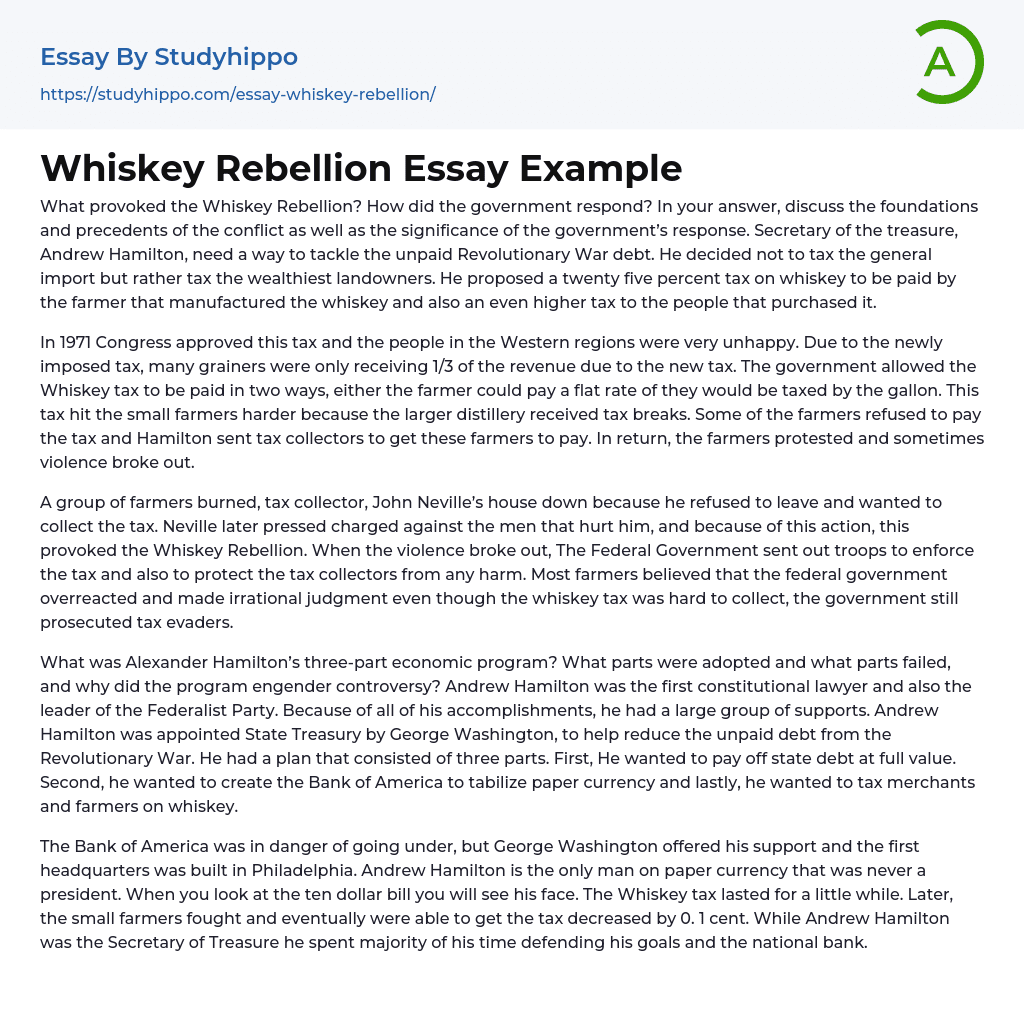What provoked the Whiskey Rebellion? How did the government respond? In your answer, discuss the foundations and precedents of the conflict as well as the significance of the government’s response. Secretary of the treasure, Andrew Hamilton, need a way to tackle the unpaid Revolutionary War debt. He decided not to tax the general import but rather tax the wealthiest landowners. He proposed a twenty five percent tax on whiskey to be paid by the farmer that manufactured the whiskey and also an even higher tax to the people that purchased it.
In 1971 Congress approved this tax and the people in the Western regions were very unhappy. Due to the newly imposed tax, many grainers were only receiving 1/3 of the revenue due to the new tax. The government allowed the Whiskey tax to be paid in two ways, eit
...her the farmer could pay a flat rate of they would be taxed by the gallon. This tax hit the small farmers harder because the larger distillery received tax breaks. Some of the farmers refused to pay the tax and Hamilton sent tax collectors to get these farmers to pay. In return, the farmers protested and sometimes violence broke out.
A group of farmers burned, tax collector, John Neville’s house down because he refused to leave and wanted to collect the tax. Neville later pressed charged against the men that hurt him, and because of this action, this provoked the Whiskey Rebellion. When the violence broke out, The Federal Government sent out troops to enforce the tax and also to protect the tax collectors from any harm. Most farmers believed that the federal government overreacted and made irrationa
judgment even though the whiskey tax was hard to collect, the government still prosecuted tax evaders.
What was Alexander Hamilton’s three-part economic program? What parts were adopted and what parts failed, and why did the program engender controversy? Andrew Hamilton was the first constitutional lawyer and also the leader of the Federalist Party. Because of all of his accomplishments, he had a large group of supports. Andrew Hamilton was appointed State Treasury by George Washington, to help reduce the unpaid debt from the Revolutionary War. He had a plan that consisted of three parts. First, He wanted to pay off state debt at full value. Second, he wanted to create the Bank of America to tabilize paper currency and lastly, he wanted to tax merchants and farmers on whiskey.
The Bank of America was in danger of going under, but George Washington offered his support and the first headquarters was built in Philadelphia. Andrew Hamilton is the only man on paper currency that was never a president. When you look at the ten dollar bill you will see his face. The Whiskey tax lasted for a little while. Later, the small farmers fought and eventually were able to get the tax decreased by 0. 1 cent. While Andrew Hamilton was the Secretary of Treasure he spent majority of his time defending his goals and the national bank.
- Money essays
- Financial Accounting essays
- Market Segmentation essays
- Supply And Demand essays
- Purchasing essays
- Forecasting essays
- Legacy essays
- Bank essays
- Corporate Finance essays
- Financial News essays
- Financial Ratios essays
- Financial Services essays
- Free Market essays
- Shareholder essays
- Personal finance essays
- Equity essays
- Financial Crisis essays
- Banking essays
- Credit Card essays
- Currency essays
- Debt essays
- Gold essays
- Loan essays
- Enron Scandal essays
- Foreign Exchange Market essays
- Investment essays
- Venture Capital essays
- Stock Market essays
- Retirement essays
- Donation essays
- Net Present Value essays
- Income Statement essays
- Commercial Bank essays
- Debit Card essays
- Deposit Account essays
- Subprime Lending essays
- Perfect Competition essays
- Underwriting essays
- Synergy essays
- Valuation essays
- Investing essays
- Asset essays
- Depreciation essays
- Discounted Cash Flow essays
- Foreign Direct Investment essays
- Funds essays
- Internal Rate Of Return essays
- Revenue essays
- Day Trading essays
- Futures Trading essays




